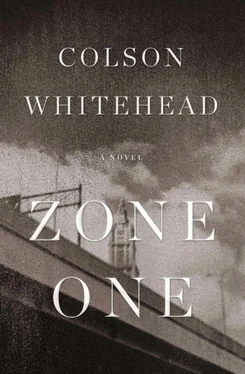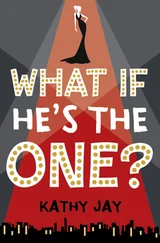After they finished trading glory stories over their personal hauls, the conversation turned to speculation about the cigarette-salvage possibilities of Manhattan. A lot of people had taken up smoking lately. News of a potential NYC operation was starting to get out, and that morning’s couriers from Buffalo disseminated gossip about the latest operation down South, a hydroelectric plant brought online. Then one of the snipers—Gibson was his name—told a story about a skel bonfire gone awry, which broke everybody up. The skel on top had been neutralized, but a chunk of his brain was still sending orders, apparently. The fire activated the creature so that it looked like the skel was “break dancing” in the flames. Mark Spitz had been laughing with the rest of them, more on account of Gibson’s deadpan delivery than the anecdote, when his head was suddenly encased in lead and his vision went on the fritz. It was as if he’d been hit on the head with a pipe—he’d actually been hit in the head with a lead pipe in college, when a gang of townies had invaded the Spring Concert looking for trouble. In retrospect, this drowning sensation was the first indication that something started to go wrong with him when he came in from the wasteland.
He needed air. Mark Spitz ducked through the plastic tent flaps and lost himself in the rows of cabins, staggering between the red-and-yellow nylon tents containing the new arrivals who were also spending their first night at Happy Acres. He sensed them stiffening at his slow footfalls, which made him sound like one of the dead. They poked a head out, then calmed themselves and withdrew. He wandered toward the line of sodium lights at the far edge of camp. There they were, behind the fence, lit up, regimented, droopy with promise: the holy stalks, up to his chest and disappearing into the darkness. He’d been eating three squares a day, listening to actual jokes, seeing whole ragamuffin gangs of kids—when was the last time he saw more than one kid at a time? And now, fresh corn. The miracles turned routine. They pushed up like weeds.
“Back away from the fucking corn, dude.” The two guards pointed their weapons at his head, at two of the five recommended skel-dropping points. The sentries couldn’t have been older than sixteen. He didn’t begrudge them their duty. The crops were important. The crops separated today’s iteration of humanity from last year’s. He waved the rifles away and gaped. It was funny: up against the gate, shivering in the slight wind, they were almost an army of skels approaching the camp’s delicious signs of human life. Half the stuff was probably going to Buffalo, but that didn’t matter. It was still a wonder. Mark Spitz backed away from the fucking corn.
The Lieutenant said, “And again, please ignore the scuttlebutt about what they use for fertilizer. What else, my young friends, what else? Supposedly the new incinerator is going run double our capacity, so you know what that means—”
“Ash Wednesday!” yelled someone in the back.
“And Thursday and Friday.” The Lieutenant consulted the feed and informed them that a senior board member of that juggernaut clothing empire had turned up at Victory’s Sword and magnanimously pledged his company’s goods to the effort. The Lieutenant allowed his troops a minute, and then told them to simmer down. It would be difficult to describe their enthusiasm as unwarranted. The company cultivated four product lines: an upscale boutique providing sophisticated apparel fit for a day at the office or an evening out on the town; a mass-market suite of sensible, everyday basics; modestly priced designs for the cost-conscious consumer; and a recently acquired purveyor of plus-size lingerie that had fallen on hard times but had been turned around by the smart management of their new parent company. All the clothes were well crafted regardless of their price point; the company kept abreast of the latest fronts in cheap child labor. “The entire corporate family is open for business,” the Lieutenant said, “for any item with a retail price of under thirty dollars. Check the price tags, fellas! If you need new skivvies or a sweatshirt or something.”
“Can’t get no sweatshirt under thirty dollars!”
Someone in the back, at one of the undesirable tables by the toilets, countered that it was easy enough to acquire a sweatshirt for less than that sum at the bargain store. Another seconded this assertion.
“Gary’s getting some big-lady teddies,” yelled one of Gary’s old cronies.
“We think it feels good under the mesh—you should try it,” Gary said, baring his gray teeth in a line. Everyone who worked with Gary quickly adjusted to the man’s habit of referring to himself with the first-person plural. He was a triplet, one of three brothers. The other two perished on Last Night, but Gary continued to speak for their collective, maintaining what Mark Spitz assumed was a lifelong practice of presenting a united fraternal front to all who did not share their precise genetic makeup. It was a disturbing vision, Gary and his other versions standing in their mobile home’s kitchen demanding sweets or more cartoons, much more disturbing than hearing a man in combat fatigues relate the enthusiasms of ghosts. PASD had as many faces as there were uninfected, and, as was the case with the Wasteland Starers, you took someone else’s particular symptoms as harmless foibles. Simple courtesy, lest they take objection to yours.
Mark Spitz resolved to pick up some new socks. Now that the anti-looting regs were in effect, everyone—soldier and civilian and sweeper alike—was prohibited from foraging goods and materials belonging to anyone other than an official sponsor, whether it was Southern whiskey or all-natural depilatories. Food was exempt—juice boxes were still legal tender in some parts of the country—but for the most part, no more stealing, people. There had been laws once; to abide by their faint murmuring, despite the interregnum, was to believe in their return. To believe in reconstruction.
The prohibitions were hard to enforce, however, for obvious reasons. The civilians in the camps could be policed, as most never left the perimeter, but untold Americans still walked the great out there, beyond order’s embrace, like slaves who didn’t know they’d been emancipated. The sanctioned salvage teams were largely unsupervised and the soldiers had personal needs that escaped the classifications on requisition forms, did not have ID numbers. Officers confiscated contraband when it was flaunted in their faces—designer sunglasses and the robust leathers favored by motorcycle fans of both serious and dilettante persuasion—but they had better things to do than babysit. Kaitlyn, in deference to the hall-monitor part of her disposition, kept watch on the two men under her supervision, Gary especially, and for good reason. He’d been a master bandit before the rise of the camps and, in addition, rather enjoyed Kaitlyn’s shrill intonation when she used her discipline voice.
Buffalo created an entire division dedicated to pursuing official sponsors whenever a representative turned up, in exchange for tax breaks once the reaper laid down his scythe and things were up and running again. (Additional goodies the public would never find out about weeviled the fine print.) There were understandable difficulties in tracking down survivors in positions of authority over, say, the biggest national pharmaceutical chain or bicycle manufacturer, but they strolled into camp from time to time, with the typical scars but eager to contribute. They generally put a price cap on their goods or specified a particular product in their brand family, one not too dear, but their sacrifices were appreciated nonetheless. Pledge all your tiny cartons of children’s applesauce, in all the nation’s far-flung groceries and convenience stores? It was a no-brainer: they were expired anyway. The civilians out in the wild, unaware of the regulations, would be welcomed into the system in time, and they would obey.
Читать дальше












